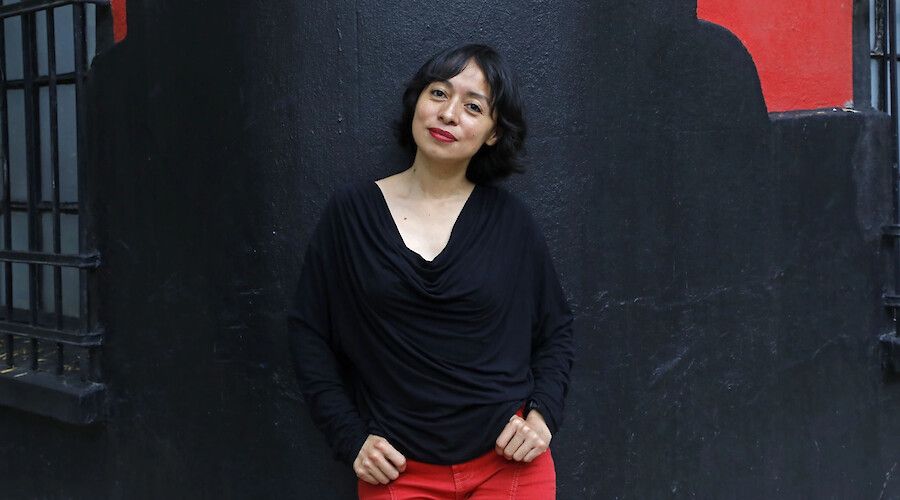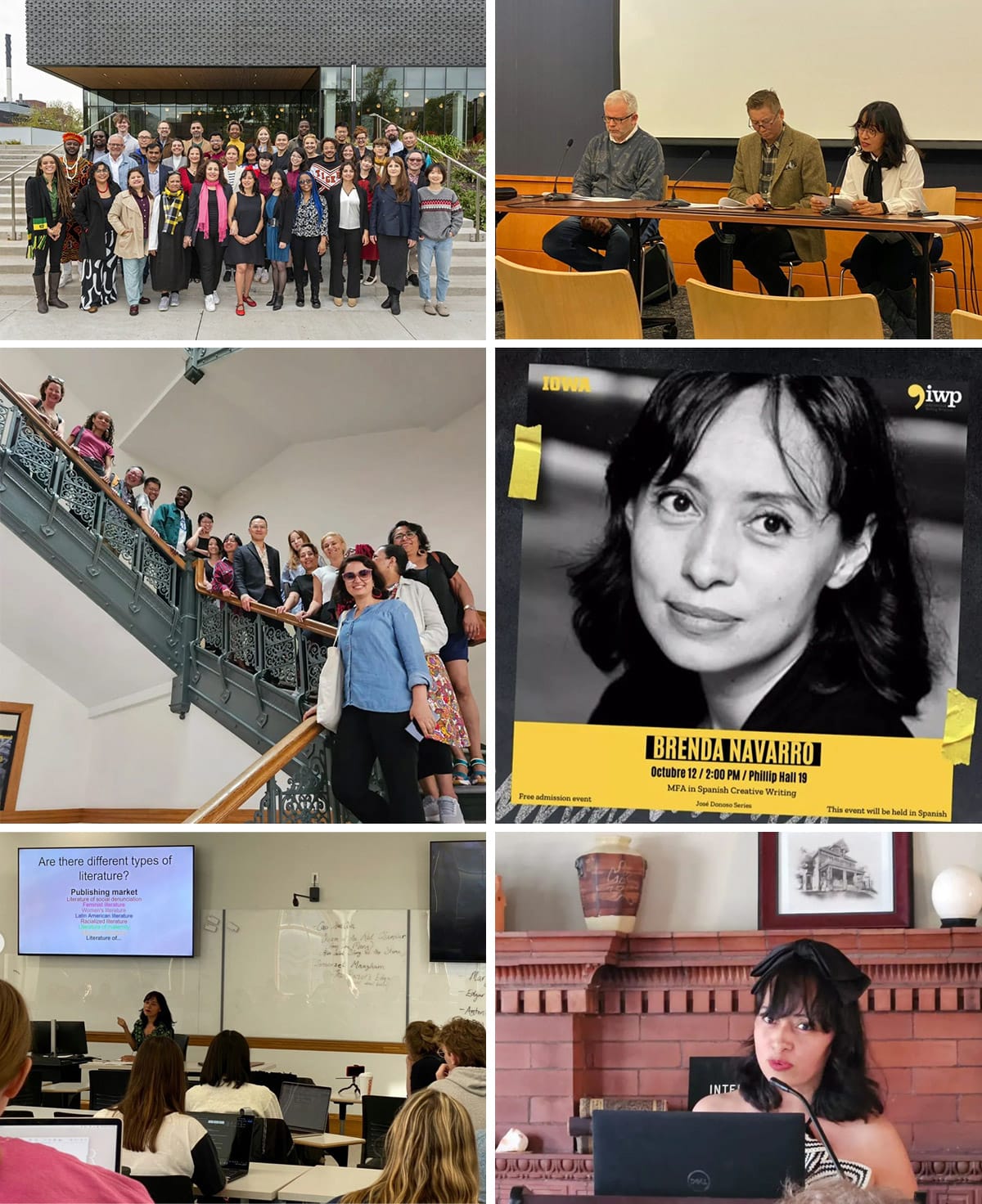Brenda Navarro at the International Writing Program at the University of Iowa

Mexican-Spanish author Brenda Navarro joins The International Writing Program at the University of Iowa for the 2023 edition of it annual residency.
The International Writing Program (IWP) is a conduit for the world’s literatures, connecting well-established writers from around the globe, bringing international literature into classrooms, introducing American writers to other cultures through reading tours, and serving as a clearinghouse for literary news and a wealth of archival and pedagogical materials. Since 1967, over 1500 writers from more than 150 countries have been in residence at the University of Iowa.
The Residency, which usually runs from late August to mid-November, is designed for established and emerging creative writers —poets, fiction writers, dramatists, and nonfiction writers. The Residency provides writers with time, in a setting congenial to their efforts, for the production of literary work. It also introduces them to the social and cultural fabrics of the United States, enables them to take part in American university life, and creates opportunities for them to contribute to literature courses both at the University of Iowa and across the country.
As part of the residency, Brenda Navarro will participate in a mix of recurring weekly events and special one-time engagements, such as weekly Shambaugh House readings on Fridays, weekly readings at Prairie Lights Books on Sundays, weekly “Cinematheque” screenings on Sundays, weekly community kitchen days for the writers, opportunities to speak to students in the International Literature Today class, and a variety of cultural excursions and one-off events such as:
- September 1: Reading in the historic Shambaugh House by Brenda Navarro (Spain) and Maricela Guerrero (Mexico)
- October 18: IWP Infinite Dream Panel (part of the Infinite Dream festival)
- October 20: Panel conversation with Brenda Navarro (Spain), Guru Ladakhi (India), and Artur Domosławski (Poland) – “Must a Migrant Be Grateful?”
- November 3: Images of America panel discussion – Residency writers discuss their time in and impressions of the U.S.
The International Writing Program (IWP) is a meeting place for writers that in one sense changes the way you return home. Not only because it allows you to have a real and consistent time to write, but also because having the opportunity to live with a multicultural universe allows you to encounter different points of view that enrich you not only as a person, but also in your own creative work and that is essential for anyone who wants to improve their literary writing.
Since I received the official invitation and had the first interview with the program coordinator Shelly Criswell and John Lyons, one of the program assistants, we joked with the idea that I would have the opportunity to narrate my own experience in the style of the book Ciudades desiertas (1982), written by Mexican writer José Agustín. This was significant because from the first moment I arrived in Iowa I was not only looking for the references that literature itself had given me about the city, but the expectation increased when I was part of that kind of “Tower of Babel” that implies the challenge of being able to communicate with your colleagues coming from different parts of the world and that somehow re-positioned you in the world.
For my part, the Iowa River was essential for my creative process and the development of my literary work. But what was crucial was the support I had from all the people involved in the program, including the Spanish and Portuguese department (Ana Merino’s welcome, Horacio Castellanos Moya’s friendship, Luis Muñoz’s warmth and professionalism, and the conversations with the MFA students) throughout my stay because they allowed me to feel supported and with the opportunity to live between two worlds: the international one with my colleagues in the residency and the world where Spanish was our language of communication. My own deserted cities, in feminine, a twist that José Agustín could expect in this 21st century.
At the first welcome meeting the program director Christopher Merrill stressed that above all things, we would have to prioritize our writing time. That we would have an intense and interesting cultural offer, that there would be temptations to immerse ourselves in all that the city had to offer, but that the essential thing was our literary project. And although I tried to follow the advice, the reality is that all the activities of my colleagues were so attractive that we could not refuse to attend as many as possible, in addition to the museums, concerts, city outings and trips to Chicago and New York that the program scheduled for the group of residents.
I had the opportunity to open the Reading Program at the legendary Shambaugh House with my fellow poet Maricela Guerrero on September 1, 2023 and we did a performance where English and Spanish were mixed interchangeably.
Then, on October 16, I was able to speak about my work in the World Literature Class led by Christopher Merrill along with three of my classmates. There I highlighted the importance of prioritizing literature over market or academic labels and the recognition of translation to continue building bridges between diverse cultures. A way of recognizing the power of language to shape the world. And finally, on October 20, I was part of the Panel Discussion Series held at the Iowa Public Library, along with two colleagues who contrasted their views on whether migrants should be thanked.
Part of my sample was read as part of the Global Express Program that gives international writers the unique opportunity to see their work performed by students from the UI Department of Theatre Arts and local community members before an American audience. It was a beautiful experience.
However, one of the best experiences was on October 12th when I shared part of my work within the MFA Spanish Creative Writing at Phillip Hall building, because we talked about the importance of writing with and from the mother tongue and with the certainty that the Spanish language is enriched throughout Latin America and Spain.
I can only be grateful for the opportunity that the Embassy of Spain gave me to have this experience, which has undoubtedly changed the way I inhabit the world and gave me the opportunity to write part of my third novel.
—Brenda Navarro
About the artist
Fiction writer and editor Brenda Navarro is the author of the novels Casas Vacías, published in English as Empty Houses (2021), which won Spain’s Tigre Juan Award in 2020, and Ceniza en la boca (Mouth Full of Ash), the recipient of the 2022 Best Book of Fiction awarded by Spanish booksellers and placing on the 2023 Premio Vargas Llosa shortlist.
She’s currently working on fiction “about language and borders within the US-Mexico space of war.” Her participation is courtesy of the Embassy of Spain in Washington D.C. and a gift from the estate of W.B. Quarton.
